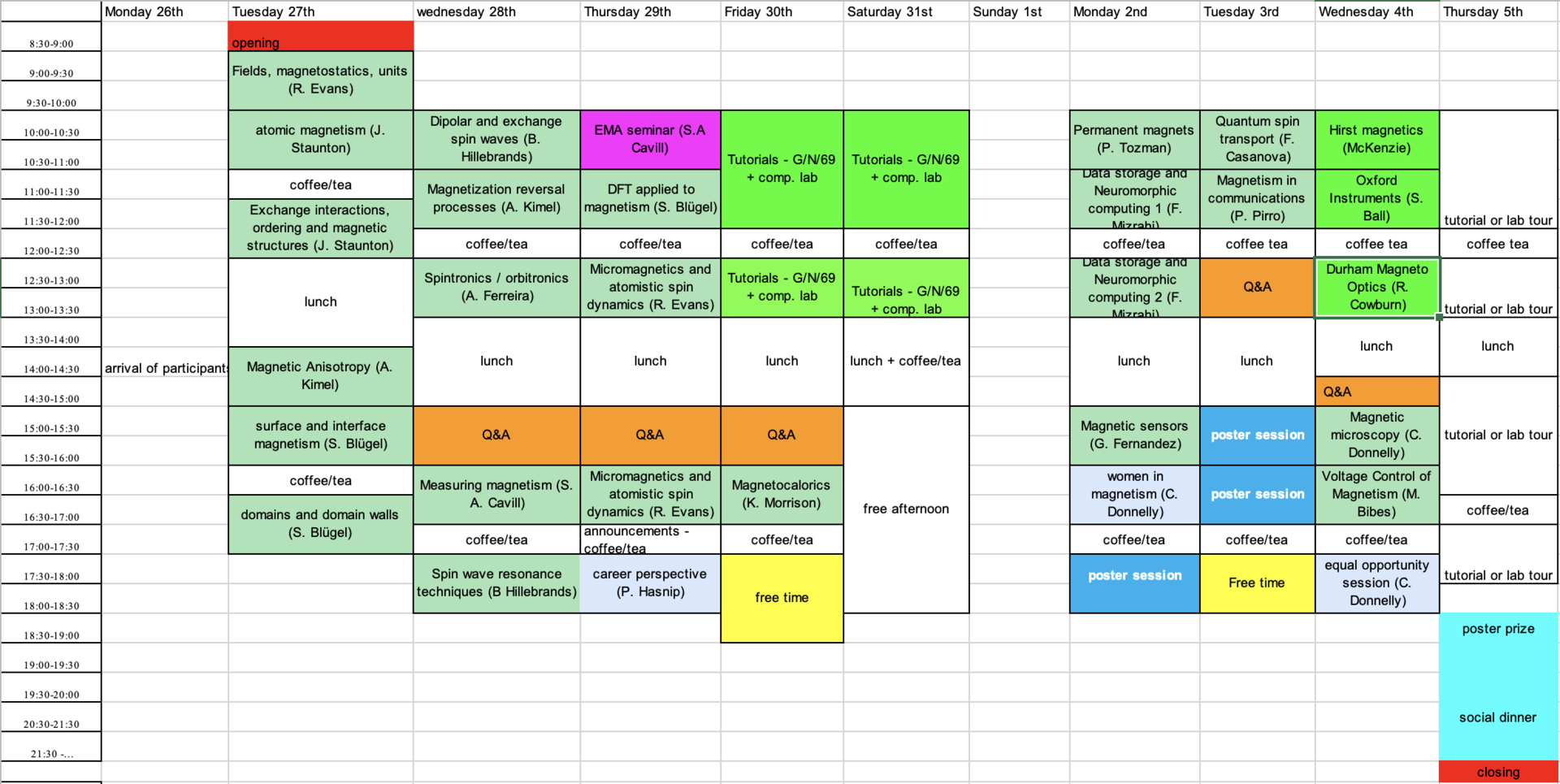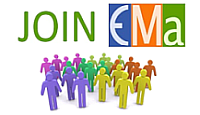Program

List of topics and lecturers for ESM 2024, along with slides and recordings.
Lectures
Opening: Bertrand Dupé, General Chair of ESM, Liège, Belgium [ Slides ]
I. Fundamentals
- Magnetic moments, dipoles and fields: Richard Evans, York, UK [ Slides | Recording ]
- Atomic magnetism: Julie Staunton, Warwick, UK [ Slides | Recording ]
- Exchange interactions, magnetic order and structure: Julie Staunton, Warwick, UK [ Slides | Recording ]
- Magnetic anisotropy: origin, intuitive models, examples: Alexey V. Kimel, Nijmegen, The Netherlands [ Slides | Recording ]
- Surface and interface magnetism: Stefan Blügel, Jülich, Germany [ Slides | Recording ]
- Domains and domain walls: Stefan Blügel, Jülich, Germany [ Slides | Recording ]
- Dipolar and exchange spin waves: Burkard Hillebrands, Kaiserslautern, Germany [ Slides | Recording ]
- Magnetization reversal: from fundamental principles to fundamental limits Alexey V. Kimel, Nijmegen, The Netherlands [ Slides | Recording ]
- Spintronics / Spin-Orbitronics: Aeres Ferreira, York, UK [ Slides ]
II. Techniques
- Magnetic measurement instruments and techniques: Stuart Cavill, York, UK [ Slides | Recording ]
- Spin-wave resonance techniques: Burkard Hillebrands, Kaiserslautern, Germany [ Slides | Recording ]
- Magnetic microscopy: Claire Donnelly, Dresden, Germany [ Slides | Recording ]
- Density functional theory applied to magnetism: Stefan Blügel, Jülich, Germany [ Slides | Recording ]
- Micromagnetic and atomistic simulations of magnets: Richard Evans, York, UK [ Slides: pt.1,pt.2 | Recording: pt1,pt2 ]
III. Functions and applications
- EMA Plenary Lecture: Magnetism for Energy Efficient Devices Stuart Cavill, York, UK [ Slides | Recording ]
- The magnetocaloric effect: Kelly Morrison, Loughborough, UK [ Slides | Recording ]
- The spin Hall effect: Felix Casanova, San Sebastian, Spain [ Slides | Recording ]
- Data storage and neuromorphic computing: Frank Mizrahi, Paris, France [ Slides | Recording: pt1,pt2 ]
- Electric-field control of magnetism: Manuel Bibes, Paris, France [ Slides | Recording ]
- Magnetic sensors: Gonzalo Vallejo Fernandez, York, UK [ Slides | Recording ]
- Permanent magnets: Pelin Tozman, Darmstadt, Germany [ Slides | Recording ]
- Magnetism in communications: Philip Pirro, Kaiserslautern, Germany [ Slides | Recording ]
- Permanent magnets for energy efficient design: James McKenzie, Hirst Magnetic Technologies Ltd. [ Slides ]
IV. General-interest sessions
- EMA Young Working Group: Sofia Ferreira Texeira, San Sebastian, Spain [ Slides ]
- Early career discussion: Phil Hasnip, York, UK [ Slides | Recording ]
- Career perspective: a career in superconducting magnets: Steven Ball, Oxford Instruments [ Slides ]
- Diversity in Magnetism: What can we do? Claire Donnelly, Dresden, Germany [ Slides ]
Other activities
Practicals
Practical are organized to practice the use of numerical, analytical or experimental techniques, related to topics covered by the lectures. They are proposed both to onsite and online participants.
Question-Answer sessions (5-10h)
The purpose of a research School is to provide young scientists with the basics in a working field. With this respect interactivity between students and lecturers should be promoted. Like in the previous editions, a key aspect of this interactivity is the possibility to raise questions at the end as well as during the course of the lectures, both for onsite and online participants. Besides, several sessions of questions take place, during which the lecturers or voluntary students present in more detail issues raised by the students during the lectures or anonymously through a question-box.
Posters
We encourage participants to bring posters to present their work. Poster will be displayed at all times during the school, plus with dedicated poster tims slots. Students are also asked to present their poster in a one-slide teaser as an exercice to summarize their work. Several poster prizes will be awarded, including a voucher for free attendance to the next Joint European Magnetism Symposia conference.
Final schedule







